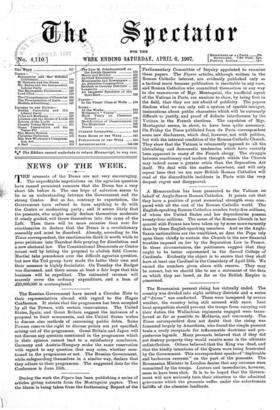Durin g the week the Figaro has been publishin g a series
of articles giving extracts from the Montagnini papers. Thus the bloom is being taken from the forthcoming Report of the Parliamentary Committee of Inquiry appointed to examine these papers. The Figaro articles, although written in the Roman Catholic interest, are evidently published only as a tactical move because publication is inevitable in any case, and Roman Catholics who committed themselves in any way 533 to the manmuvres of Mgr. Montagnini, the unofficial agent of the Vatican in Paris, are anxious to show, by being first iu the field, that they are not afraid of publicity. The papers disclose what we can only call a system of ignoble intrigue, insinuations about public characters which will be extremely difficult to justify, and proof of definite interference by the Vatican in the French elections. The expulsion of Mgr. Montagnini seems, in short, to have been quite necessary. On Friday the Times published from its Paris correspondent some new disclosures, which deal, however, not with politics, but with the internal condition of the Roman Catholic Church. They show that the Vatican is vehemently opposed to all the liberalising and democratic tendencies which have recently been apparent in many of the French clergy. The struggle between reactionary and modern thought within the Church may indeed cause a greater crisis than the Separation Act itself. We deal with the matter elsewhere, and will only repeat here that we are sure British Roman Catholics will read of the discreditable incidents in Paris with the very deepest regret and disapproval.










































